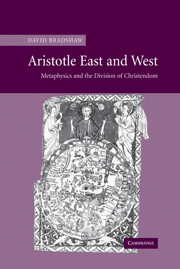Book contents
- Frontmatter
- Contents
- Preface
- 1 The Aristotelian beginnings
- 2 The Prime Mover
- 3 Between Aristotle and Plotinus
- 4 Plotinus and the theory of two acts
- 5 The Plotinian heritage in the West
- 6 Gods, demons, and theurgy
- 7 The formation of the eastern tradition
- 8 The flowering of the eastern tradition
- 9 Palamas and Aquinas
- 10 Epilogue
- Bibliography
- Index
4 - Plotinus and the theory of two acts
Published online by Cambridge University Press: 22 September 2009
- Frontmatter
- Contents
- Preface
- 1 The Aristotelian beginnings
- 2 The Prime Mover
- 3 Between Aristotle and Plotinus
- 4 Plotinus and the theory of two acts
- 5 The Plotinian heritage in the West
- 6 Gods, demons, and theurgy
- 7 The formation of the eastern tradition
- 8 The flowering of the eastern tradition
- 9 Palamas and Aquinas
- 10 Epilogue
- Bibliography
- Index
Summary
With Plotinus (c. 205–270) we are again in the presence of a philosophical mind of the first rank. Plotinus is conventionally regarded as the founder of Neoplatonism, and it is certainly true that he looks to Plato for inspiration more than to any other philosopher. But scholars have long recognized that in many ways he is as much indebted to Aristotle as to Plato. Something of Plotinus' attitude to Aristotle emerges in the following passage of the Life of Plotinus by Porphyry, who was Plotinus' student and an important philosopher in his own right.
In writing he is concise and full of thought. He puts things shortly and abounds more in ideas than in words; he generally expresses himself in a tone of rapt inspiration, and states what he himself really feels about the matter and not what has been handed down by tradition. His writings, however, are full of concealed Stoic and Peripatetic doctrines. Aristotle's Metaphysics, in particular, is concentrated in them … In the meetings of the school he used to have the commentaries read, perhaps of Severus, perhaps of Cronius or Numenius or Gaius or Atticus, and among the Peripatetics of Aspasius, Alexander, Adrastus, and others that were available.
(14)As A. H. Armstrong remarks in a note on this passage, it “shows clearly how scholarly and professional a philosopher Plotinus was and how he worked, though with great originality, on the basis of an extensive school tradition.”
Information
- Type
- Chapter
- Information
- Aristotle East and WestMetaphysics and the Division of Christendom, pp. 73 - 96Publisher: Cambridge University PressPrint publication year: 2004
